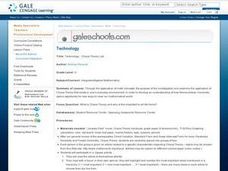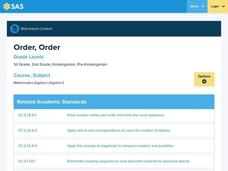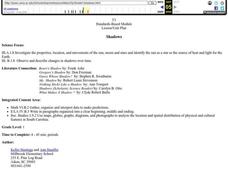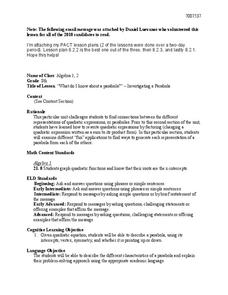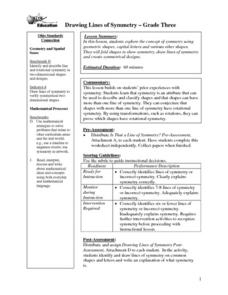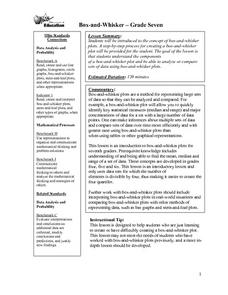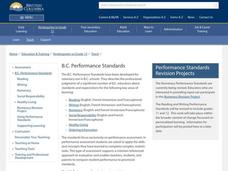Curated OER
Technology - Chaos Theory Lab
Ninth graders gain an understanding of Chaos Theory that exists in one's everyday environment.
Curated OER
Exponents
Sixth graders explore mathematics by participating in a SMART Board activity. In this exponents lesson, 6th graders identify the different exponential powers of a number and discuss how the power of the number accumulates. Students...
Curated OER
Multiplication: Building Models, Representations and Explanations
First graders explore multiplication concepts through skip counting, repeated addition and arrays. Using animal characteristics as a context, 1st graders solve problems using mathematical tools such as hundreds charts, number lines, ...
Curated OER
Exponents And Monomials
Learners practice different skills of mathematics used when working with exponents. The lesson has examples that can be used during direct instruction. They complete an exercise on a worksheet before advancing to a new standard.
Curated OER
Activity Plan 5-6: Searching for Shapes
Students explore the shapes all around them. In this early childhood lesson plan, students use their creative thinking skills to compare shapes to the form ob objects in their classroom.
Curated OER
Tell Time
In this telling time activity, students draw lines to match times shown on clock faces with written times. A reference website for additional resources is given.
Curated OER
3 dimensional shapes
Students play a bingo game to classify 3 dimensional shapes. In this 3 dimensional shapes lesson plan, students identify, describe, and classify shapes by playing a bingo game.
Pennsylvania Department of Education
Order, Order
Students use pictures to identify items as ordinal numbers. For this ordinal numbers lesson plan, students use the words "before" and "after" to identify the pictures as well.
Curated OER
Exploring Literature And Weather Through Chirps
Pupils explore using crickets' chirps to calculate temperature. They read "Cricket in Times Square" and "The Quiet Cricket," read and discuss a Cricket eBook, develop a formula and calculate temperature using cricket chirps, and graph...
Curated OER
How To Use A Protractor
Fifth graders use the SMART Board to demonstrate how to use a protractor to measure acute, obtuse, and right angles. In this protractor lesson plan, 5th graders also complete an angles worksheet.
Curated OER
Place Value
Second graders use physical models to represent and demonstrate place value concepts by using base-ten blocks and hundreds charts. They compare numbers to see which number is smaller or larger and put numbers in order from smallest to...
Curated OER
Shadows
First graders measure how a shadow changes over the course of a day. They write about what they would do if they lost their shadow, and make silhouettes of themselves. Students make up a shadow dance and read stories about shadows.
Curated OER
Foot Book Lesson Plan
Students measure items using non-standard units of measure. In this measurement lesson, students listen to Dr. Seuss', The Foot Book, before using oak tag feet to measure items. They use a large foot and a smaller one to measure...
Curated OER
Investigating Parabolas
Students identify properties of parabolas. In this algebra lesson, students factor quadratic equations and identify the properties of parabolas. They find the roots, vertex and intercepts of a parabola.
Curated OER
Order of Operations
Sixth graders perform the Order of Operations. Given various story problems, groups of students solve equations requiring division, multiplication, parenthesis, exponents and other mathematical processes. They discuss the order of...
Curated OER
Cook-A-Doodle Doo! Lesson Plan
Students enjoy the excitement in the short story, Cook-A-Doodle-Doo! In this Cook-A-Doodle Doo! lesson plan, students work to tell the difference between fact and fiction, learn vocabulary, and compare and contrast different stories.
Curated OER
Fall Leaves Fall! Lesson Plan
Students discover facts about leaves. In this early childhood lesson plan, students identify different types of leaves, and make predictions about which types of leaves they think they will find in their community. Students collect...
Curated OER
Angles, Lines and Transversals
Students identify and determine angle pair relationships. In this geometry activity, students identify different angles of parallel lines that are cut by transversals. They identify interior and exterior angles after watching a video.
Curated OER
Balancing Discoveries
Students use a balance to help them with their addition facts. In this addition lesson plan, students also play the seven up game to memorize their facts.
Curated OER
Investigating Quadrilaterals
Fourth graders discuss the various attributes of quadrilaterals. In groups, they use the attributes to sort quadrilaterals into different classes and a hierarchy. They review the new vocabulary and attributes with a partner to end the...
Curated OER
Drawing Lines of Symmetry
Third graders explore the concept of symmetry using geometric shapes, capital letters and various other shapes. They fold shapes to show symmetry, draw lines of symmetry and create symmetrical designs.
Curated OER
Box-and-Whisker
Seventh graders are introduced to the concept of box-and-whisker plots. A step-by-step process for creating a box-and-whisker plot is provided. The goal of the lesson is that students study the components of a box-and-whisker plot and be...
Curated OER
Graphs Galore
Fourth graders conduct surveys to collect data. They analyze and interpret the data, then determine which type of graph is appropriate for the data. Students use the data to make predictions, discover patterns and draw conclusions...
Curated OER
Childhood Obesity
Students identify a question to generate appropriate data and predict results. They distinguish between a total population and a sample and use a variety of methods to collect and record data. Students create classifications and ranges...
